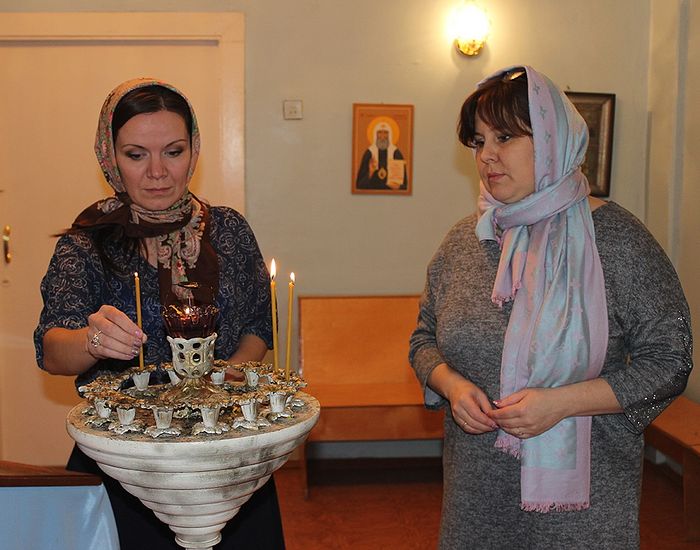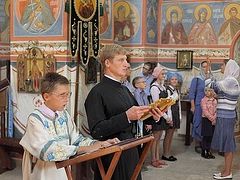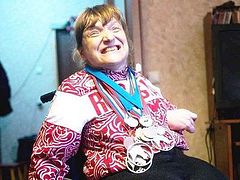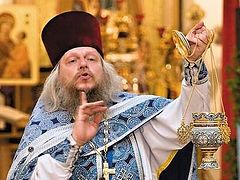Over twenty years ago the Church of the Protection of the Mother of God was opened at the Psychoneurological Home in Syktyvkar, the capital city of Komi [an autonomous republic in Russia, situated to the west of the Ural mountains]. Services are held here by the clergy of the Kazan icon of the city of Syktyvkar. Some of its first parishioners grew into world-famous sport celebrities, and the participation in the holy sacraments helps its present residents overcome their maladies. The priests, some staff members and residents of the Psychoneurological Home told readers of Pravoslavie.ru about the role of spiritual life and prayer for the Home.
World renown
As you drive into the city of Syktyvkar, you see this towering castle-like brick building with the long name: “the Kochpon Psychoneurological Home”. This closed medical and social institution will celebrate its ninetieth anniversary next year. Over this period it has become world-famous. During the Second World War, the then Kochpon Children’s Home sheltered children who had been evacuated from Leningrad at its siege. One of them, Olga Yangel, was found there afterwards by her parents and taken to Estonia.
Since 1979, the Kochpon Children’s Home has held seminars for teachers and tutors of boarding-schools, instructors in labor, headmasters and directors of studies of boarding institutions who would come here from all over the Soviet Union. Representatives of public organizations from England, Finland, Switzerland, and the USA visited the Home as well.
At present, 395 people reside in the Home’s five buildings. 187 of them are handicapped children aged four to seventeen, the others are disabled people over the age of eighteen. The Kochpon Psychoneurological Home admits people with moderate to profound mental retardation. Some of them also have concomitant diseases, such as cerebral palsy, schizophrenia, and epilepsy. Currently autism cases are on the rise. The Kochpon Home is one of the few institutions of this kind to admit bed patients as well.
To an outside observer, it might seem as if patients of the Kochpon Home are just huddled together in a closed space, yet in reality their lives are eventful. Disabled adults from the social and labor rehabilitation department work on the territory of their Psychoneurological Home in sewing, cardboard, and carpenter’s workshops.
 The Kochpon Psychoneurological Home’s Director Olga Busheneva (to the right) and Assistant Director Maria Kropaneva attending the service at the Holy Protection Church
The Kochpon Psychoneurological Home’s Director Olga Busheneva (to the right) and Assistant Director Maria Kropaneva attending the service at the Holy Protection Church Educational courses are organized for handicapped children. Some patients attend the boarding school of the city of Syktyvkar, which provides remedial education. But most of the children study at the Kochpon Home. These children are bed ridden or with severe mobility impairments. Those with profound and severe mental retardation (which is frequently accompanied by outwardly and inwardly directed aggressive behavior) are taught as well. “We have been granted a license allowing us to provide supplementary education. Our Home’s patients go to up to ten different hobby groups,” Assistant Director of the Kochpon Home Maria Kropaneva related.
Children of the Kochpon Psychoneurological Home are actively engaged in amateur arts activities and take part in local and national festivals and contests.
The Home’s staff devotes much attention to sport training of those in their care. Children can go in for sports right on the Home’s territory. In addition, teachers of schools of sports profile (“Schools of Olympic Reserve”) work with the children who are interested in professional sports.
“Our children are always kept busy. That is why you won’t see children who are lazy, drink alcohol or smoke at our Psychoneurological Home,” Maria Kropaneva added. In her view, this is explained not only by the education, labor activities, rich program of cultural and leisure-time events and active sport life, but also by many years of the Home’s joint work with the Church of the Kazan icon of the city of Syktyvkar. Patients of the Kochpon Home have bee taken to this city church for Baptisms and Communion for several decades. But, as it turned out, not all the patients could participate fully in the sacramental life of the Church.
God helped us
In 1997, Archpriest Boris Prokofiev, then priest of the Church of the Kazan icon and now cleric of the Church of the Blessed Xenia of St. Petersburg in the Vizyabozh village, suggested opening a church at the Psychoneurological Home. “During my first visit to the Kochpon Home I learned that its seriously sick children had never taken Communion,” Fr. Boris related. “Thus I suggested opening a church attached to the Home so that its bedridden residents could receive Communion on a regular basis.”
The administration of the Psychoneurological Home approved of this idea. The former parents’ room in the Home’s lobby was reconverted and reequipped to meet the needs of the “special” parishioners. The staff repaired it themselves. Fr. Boris prepared the design for the iconostasis and the Royal Doors. Both patients and staff workers made the framework of the iconostasis with planks and covered it with plywood. Three months later, several days before the feast of the Protecting Veil of the Theotokos, the church was finished. It was consecrated by the ruling bishop on the feast of the Protecting Veil of the Holy Virgin in honor of this feast.
Parishioners of the Church of the Kazan icon contributed to the decoration of the newly-built Home’s church by donating nineteenth-century icons, including a locally painted ancient icon of the Protecting Veil of the Mother of God. Among them was a large icon (5 x 6.5 feet) of the Nativity of the Most Holy Virgin. The icon was so old that one could hardly discern any images on it. But after the first few services at the Home’s church the icon miraculously renewed itself. Many icons inside the Psychoneurological Home’s church stream myrrh.
“Peace and quiet began to reign in our Psychoneurological Home after the opening of our church,” ex-Director of the Home, Nina Glushkevich, recalled. “Quarrels and discord stopped in our 500-strong team which consisted mostly of women. At that time we had over 700 children, with twenty-five children in each group, while ten children were a norm. However, we withstood all the trials and the Lord helped us! Little by little our priest blessed all the buildings, baptized all the residents and gave them Communion. Despite their great numbers and the fact that they had to live cooped up, they had no fits, which made the staff’s work considerably easier.”
Difficulties at the beginning
“Initially, seriously sick children were carried to the Home’s church on bedsheets, but it was too hard a task. Then we would give Communion to ten to fifteen children at a time. After that I suggested distributing the Body and Blood of Christ to children in their wards,” Fr. Boris went on. “I took this example from the accounts of the distribution of the Holy Communion to early Christians outside the Church. As is generally known, in the first centuries of Christianity followers of Christ would often commune in prisons, while travelling, and even at their homes. Priests or even lay-people would bring the Body and Blood of Christ to them.”
But at the beginning the priest faced great difficulties.
“Thus, we would enter a ward with some thirty people in it, all shouting,” Fr. Boris recalled. “This is how children would response to any intrusion – for example, when someone they weren’t acquainted with entered the room. But after the sacrament of Eucharist it got so quiet inside the room that it seemed as if it were empty… I explain it by the effect of the grace of God: when someone takes the Holy Communion worthily, God gives him silence, the inward peace, and joy that begin to rule his heart. This is the Holy Spirit in action. We gave Communion to seriously ill children without confession as if they were infants because they actually are children by intellect.”
Another time adults could hardly hold a two-year-old baby and keep it from seizing the chalice. “Such toddlers are afraid of being hurt and that others can make them feel pain. This boy saw a new man come in and didn’t know what to expect from him; so he was crying, trying to break away and seize the chalice,” Fr. Boris explained. “But after taking Communion he calmed down as well.” Thus the participation in the sacrament of the Church, which is regarded as the most necessary for our salvation gave the handicapped children indispensable help.”
From the Psychoneurological Home residents to sports champions
I managed to find out what became of some of the first parishioners of the Psychoneurological Home’s church. It turned out that the names of some of them are on everybody’s lips. Among them is the twenty-eight-year-old Maria Iovleva, two-time champion and silver medal winner at the Winter Paralympics in Vancouver in 2010 and world champion in cross-country skiing and the biathlon in Cable, the USA, in 2015. Maria has been very successful in sports despite the fact that she was born with a motor apparatus disorder: the woman is a wheelchair user; she has profound hearing loss and difficulty speaking. Her mother left her at the maternity home. In time the girl ended up at the Kochpon Psychoneurological Home, where she threw herself into sports and later discovered the world of Orthodoxy. Eight years ago Maria left the Psychoneurological Home and today she lives in her own house and is under the care of her sport coach Tatiana Lindt.
There are some photos in my archive on which the future prominent Russian biathlete can be seen among the parishioners of the newly-opened Home’s church. Maria was beside herself with delight when she saw these snaps from her life in the Psychoneurological Home. The sportswoman was trying to say something to me, but I didn’t get a single word, so her coach, Tatiana Lindt, had to interpret:
“This little girl is me! And this is the priest!” the young woman exclaimed, pointing at the heroes on the snap.
On one of the photos I managed to make out the moment when Maria received Communion.
“It was very long ago!” Maria recounted through her interpreter Tatiana. “I then was being treated to something very tasty.”
Attendance at the church of the Psychoneurological Home was not forgotten, so Maria and her coach Tatiana often go to city churches to this day. The woman athlete partakes in the Church sacraments, also. Maria showed me her cross and medallion featuring a depiction of the Holy Theotokos that she always keeps in her pocket. Through her coach Tatiana she explained to me that she prays before each game: “God help me!”
Among the first parishioners of the Home’s church was Ivan Golubkov. Today the twenty-two-year-old Ivan is Master of Sports of Russia. Among Ivan’s accomplishments are winning in several world cups in cross-country skiing and the biathlon for athletes with motor apparatus disorders. He is a wheelchair user like Maria Iovleva. Last year the renowned athlete left the Kochpon Psychoneurological Home and purchased an apartment in Syktyvkar. Ivan confessed that at present he goes to church very seldom: “I have neither time nor opportunity due to my frequent training sessions and practice; sometimes I am absent for up to two months and am often away from home. But I believe in God and every time I say before important competitions: ‘God bless me!’”
David
Another parishioner of the Home’s church, David Kozachenko, currently works as an acolyte at the Church of the Kazan icon in Syktyvkar. Perhaps there is nothing surprising about this (after all, some former patients of the Psychoneurological Home have worked in churches in Syktyvkar), but for one fact in David’s biography. When he was admitted to the Kochpon Home, he ended up in the ward with children who had cerebral palsy. The children couldn’t walk due to severe motor impairments. Among those who visited the boy through that difficult period in his life was an Orthodox priest who would give him Communion. “I then prayed a lot and asked God to heal me. My greatest dream was to be able to walk,” David related.
Later junior nurses in Pediatrics began to teach him to walk.
“With the help of the nurses I did two steps a day and that was a great achievement for me,” David continued his story. “Little by little I increased the number of steps. And I was lame in both legs for a long time. In time I learned to run, to jump, and to hold a spoon properly. Gradually I learned to read and write (I hadn’t been able to do anything before then). And I developed a liking for maths.”
When David turned eighteen, bearing in mind the time when an Orthodox priest would come and give him the Holy Communion, the young man asked for a job at the nearest church. “I said to the church rector that I believe in God and want to be with God!” David recalled. This year he is celebrating the tenth anniversary since he started the work.
At the service
Since the opening of the church at the Psychoneurological Home its five rectors have succeeded each other. Today Fr. Julius Yatsko gives spiritual guidance to the Home’s residents. According to the pastor, services at the Home are held on a regular basis, and its patients frequently partake of the Body and Blood of Christ. That is why they react calmly to priests’ presence and know the rules of conduct during the Eucharist. Today the majority of the parishioners of the Home’s church are adults from the rehabilitation department with moderate mental backwardness. At times up to fifty “special” worshippers gather at the church.
“I doubt that they have a clear understanding of Christ,” Fr. Boris Prokofiev said. “But what they do know is that there is God Who is the Supreme Being, Who is kind and protects everybody. So the patients turn to Him in their prayers.”
As it turned out, many of the permanent parishioners of the Home’s church have long-cherished dreams for the fulfilment of which they pray to God during each service. For instance, the dream of Katya [a diminutive form of the name Catherine] from the social and medical rehabilitation department is to be cured of her foot disease. Her room mate Nastya [a diminutive form of the name Anastasia] has the following prayer requests: “If only my mom would take me back home and we could avoid problems with documents!” Both girls take church services very seriously. But for some of the Psychoneurological Home’s residents attending services is a mere pastime “for fun”. I became convinced of this after attending a service at the Home’s church and seeing how differently the kids behaved there. While some children stayed focused on prayer, little Kolya [a diminutive form of the name Nicholas/Nikolai] with moderate mental backwardness and Down syndrome tried to play pranks all the time. Alevtina Mysova, The priest’s assistant and prosphora-baker of the Church of the Kazan icon, repeatedly rebuked the boy. Kolya would immediately quiet down, only to start laughing loudly again a minute later, distracting everyone from prayer. Igor, an autistic boy, was very restless through the service: At one moment he would sit down on a bench, at another he would sit down on another bench or look under it, and so forth. Alevtina had to stand next to Igor, while keeping vigilant watch over Kolya. However, when it was time to receive Communion, the children’s behavior changed radically. It was as if they had been transformed: the kids were no longer naughty! Both Igor and Kolya came up to the holy chalice with serious faces. It was no coincidence that the tutor Vera Reshke had taken these teenagers to the service. It turned out that the woman had discovered an amazing fact long ago: after attending the Divine Liturgy at the Home’s church the kids become not only quieter, but also more self-disciplined, nicer to each other, and begin to learn lessons better.
The thirty-three-year-old patient Olga with moderate mental backwardness and congenital hydrocephalus attend every service at the church. “Olga used to be quite aggressive. She would often shout at the top of her voice and cry – everything annoyed her. But as soon as Olga started attending services at the Psychoneurological Home’s church, her aggressive behavior disappeared for good,” the psychiatrist Elena Ustyantseva related.
“Over four years of my work in Olga’s group she has shown no signs of aggression. On the contrary, I know Olga as an industrious, very responsible, diligent, patient and quiet young lady,” the tutor Nadezhda Osipova said.
When I asked Olga about services at the Home’s church, she gave me a smile for the first time, saying: “I enjoy Church services! I like to pray and I have learned many prayers by heart! And I like to take Communion.”
As it turned out, many residents of the Psychoneurological Home regard the Holy Communion as… a remedy. “I take Communion hoping that things will go well, and everything is always fine with me,” Katya admitted. “I go to church and take Communion in order to be healthy,” her friend Nastya readily explained to me. “When I am healthy, I am in good spirits.”
As for the sacrament of Confession, I didn’t see it at the Home’s church. “When I served at the Kochpon Home, I tried to introduce the sacrament of Confession for children with moderate mental backwardness to participate, but nothing came of it,” Fr. Boris Prokofiev noted. “The problem is that many of these children have trouble with speech; besides, when asked about their sins they become bewildered and answer ‘I don’t know!’ or ‘I don’t remember!’ to any questions.” But there are at least some patients of the Kochpon Home who have a clear idea of sin. “Not only do the girls under my care believe in God, they also fear to do wrong things. They realize that if nobody knows about this, God will see it anyway,” the Home’s tutor Nadezhda Osipova recounted. Later the girls told me that they considered resentment towards their roommates, feeling anger at them, and quarrels with each other as sins. Since quite a few residents of the Kochpon Home gather at the church services, those who feel the need to repent write their sins down on a piece of paper and give the lists to the priest. Those who are unable to confess their sins receive Communion without confession as if they were infants.
Sunday meetings at the Psychoneurological Home
In addition to services at the Psychoneurological Home’s church, the Sunday school teacher of the Church of the Kazan icon Nicholas Ivasishin organized Sunday talks for the Home’s residents. The compulsory part of the program is reading the akathist hymn and talking on forthcoming Church festivals and major Biblical events. In the course of the joint reading of the akathist hymn Nicholas noted the following characteristics of the “special” children’s memory: they would repeat the unknown text of the prayers word for word, but with a slight delay. Thus it was decided to sing the Creed and the prayer “Our Father” during the Divine Liturgy together with the patients. Children repeat the words of the famous prayers diligently yet discordantly. I personally noticed that the patient of the rehabilitation department named Pavel sung all the chants of the Divine Liturgy with the choir. “I often stay with my family!” Pavel explained to me after the Liturgy, seeing my amazement. “When I stay at home, I go to church every day with my grandmother – in the morning and in the evening. That is why I have memorized all the prayers.” “Pavel even has a commemoration book with the names of his living and departed relatives, and he prays for them at every Liturgy,” the prosphora-baker Alevtina said. “Looking at some of the Home’s patients, you realize that they could easily live and be raised in families. They attend church, consciously participate in the holy services, and many of them have learned the services by heart. And they happily attend our Sunday meetings at the Kochpon Home. But perhaps our society is such that all want to live out their lives in comfort and prosperity. People are even unwilling to bear the burdens and hardships of their immediate relatives,” Fr. Vladimir Ichetkin, who once was the Psychoneurological Home’s father-confessor for two years, shared his observations with me.
On a visit to “mercy”
Now, just as twenty years ago, after giving Communion to the “special” parishioners, gathered at the Home’s church, the priest went out into the corridor and, accompanied by the choristers, a deacon and other assistants, with the chalice in his hands proceeded to the department of “mercy” for the handicapped. This department is for those with profound and severe mental retardation. The priest’s arrival provoked a buzz of general approval: The kids were waving their hands to the priest with benign smiles on their faces, and some even folded their arms over their chest. Junior medics led the kids one by one up to the holy chalice. But soon the patients lined up in a row, whereas the medical staff only observed them and called the communicants by their names. There was one fact in the whole situation that amazed me most: The children consciously partook of Holy Communion.
Performing the sacrament of the Eucharist in the department of “mercy” for the handicapped children is still psychologically difficult. There are ninety-five children in it, and sixty of them are bed patients. According to the psychiatrist Elena Ustyantseva, they only provide palliative care to children in this department. I personally got the impression that it was as if I were in a kindergarten during nap time. It turned out that my first impression was wrong as the “mercy” department’s inner life was going on, albeit hidden from outsiders’ eyes. The bedridden children were looking intently at the newcomers, but without fear or agitation. I singled out Nadenka [a diminutive and affectionate form of the name Nadezhda] from that department, who was sitting “in state” amid motley little pillows and blankets as if she were the leader of a children’s team. The girl has moderate mental retardation and spinal bifida, and, unlike other children of this department, she can sit (but not walk). Having seen the camera, the girl began to actively wave to it and gave us her kind, warm smile. Meanwhile, life around the other children was in full swing. The nurses carried them one by one away to the bathroom. Once volunteers from among the Psychoneurological Home’s residents had brought the kids back after bathing, wrapped in sheets, the caring nurses dressed and wrapped them up. The next moment the priest and his assistant bent over the kids to give them Communion. The bedridden children greeted the priest with their smiles and gladly consumed the precious Blood and Body of Christ. Out of everything I have seen in the Kochpon Home, what moved me the most were these moments of care for the seriously ill children by the priest, the nurses, and other medical staff. But it appeared that caring for this “special” flock is of great spiritual importance to the priest himself: “As you communicate with these special parishioners, you stop thinking highly of yourself,” Fr. Boris Prokofiev commented. “You begin to take pity on people, your heart softens, and Christian love (which is so rare in our modern society) enters into it. For Charity…. is the bond of perfectness (Col. 3:14). So, celebrating the Divine Liturgy at the Psychoneurological Home and taking care of the handicapped children fills your heart with an abundant grace of God that can otherwise only be acquired through pilgrimages to holy places, or the conversations with holy elders.”












